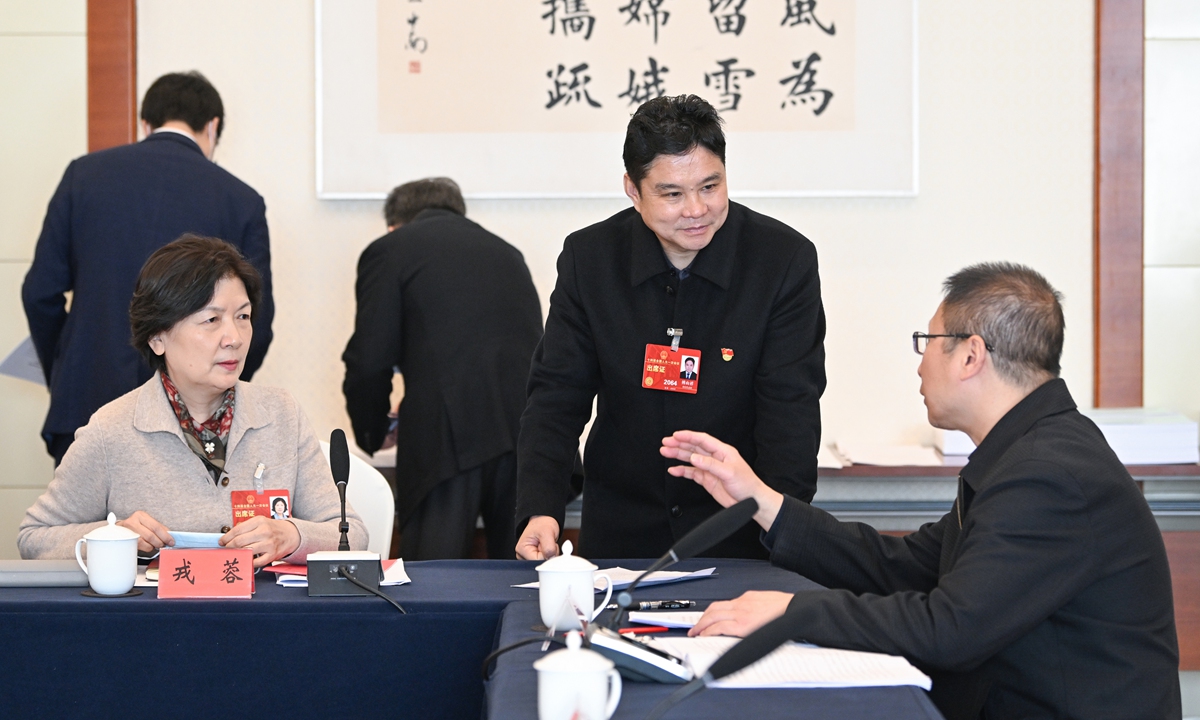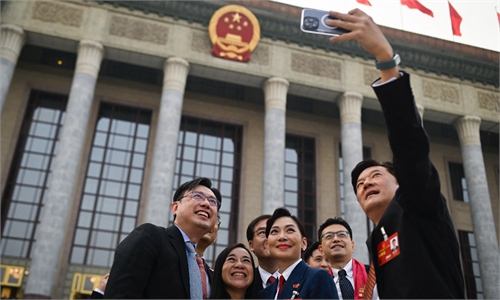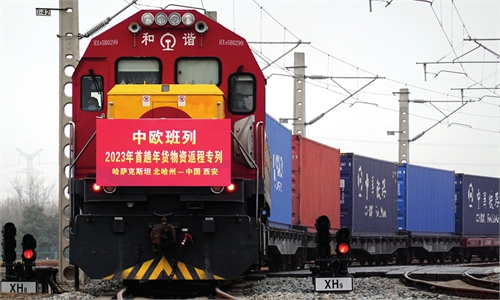'Proposing motions in the name of whole delegation' becomes a more efficient, precise way for NPC delegates to implement whole-process people's democracy
This makes priorities of different regions heard quickly, clearly: experts

The Chongqing delegation to the first session of the 14th National People's Congress held a plenary meeting to review the government work report on March 6, 2023 during the ongoing two sessions in Beijing. Photo: VCG
Many delegations attending the ongoing 14th National People's Congress (NPC) have submitted their motions in the name of the whole delegations instead of individual deputies, which has drawn wide attention.
Experts said such phenomenon shows deputies from the same region are speaking with one voice to ensure their priorities are heard more clearly, as ways to make the whole-process people's democracy more efficient and precise.
According to China Central Television (CCTV), many motions proposed this year focused on development with regional characteristics. For example, the delegation of Northeast China's Heilongjiang Province proposed a motion about black soil protection and food security, the delegation of North China's Inner Mongolia proposed to establish a national technological innovation center for rare earths and new materials, and delegations from Southwest China's Sichuan Province and Chongqing Municipality jointly proposed a motion about promoting the construction of an "economic circle of dual-cities" that aims at better integration between Chengdu, capital of Sichuan, and Chongqing, about 270 kilometers apart.
Chinese analysts said that since a provincial NPC delegation includes many deputies, if they all propose motions then there will be tons of suggestions from numerous perspectives every year, making the process of research and discussion long and inefficient. But if they propose motions in the name of the whole delegation, then it will make the priorities and urgent tasks of their regions clear and precise, to allow the problems to be addressed more efficiently and quickly.
Li Xiehua, an NPC deputy from Chongqing delegation and the deputy Party chief of the Advance Manufacturing Co Ltd under the Aluminum Corporation of China, told CCTV that to explore more potential and regional advantages for development, and to accomplish the mission to play a leading role for development in the Western region of China, Chongqing and Chengdu have to cooperate and better integrate with each other.
"This is the third time the two delegations have proposed a motion together, following the previous motions on strengthening shipping capacity and energy supply. The two delegations this year are focused on improving production capacity," Li told the CCTV.
Zhang Shuhua, director of the institute of political sciences at the Chinese Academy of Social Sciences, told the Global Times on Sunday that an efficient and effective democratic system must achieve good governance and promote the country's development, and China's whole-process people's democracy is showing its advantages in innovation and efficiency.
Deputies are an important bond for people's democracy to be practiced throughout the whole process. By performing their duties, deputies promptly report the most direct and realistic problems of the public to the governmental departments, and give positive guidance and explanations for the problems that are temporarily difficult to solve while putting forward proposals and suggestions, Zhang said.
This year, the motion proposed by the Shanghai delegation is about urging "national legislation for elder-care services," according to CCTV.
Li Jun, an NPC deputy from Shanghai, said that as an international metropolis, the city is already facing the problem of an aging society much earlier than others. "Shanghai has already done some groundwork on elder-care services, so we hope when the aging rate reaches the peak in the future, we are fully prepared to provide enough elder-care services."
This shows that the motions proposed by different delegations not only focus on their own problems or developments, but could also benefit and solve common problems shared by different regions. The relationships between different regions are not just competitive but also complementary and mutually beneficial, experts said.
By making their motions and suggestions in the name of the whole delegation, NPC deputies from different provinces, municipalities and autonomous regions will make their voice more precise and louder, and this also shows the unity of a region, experts said. This shows the innovative and unique advantages of China's whole-process people's democracy when compared with some other countries' democratic systems.
When we look at some "democratic political systems" of Western countries, the relations between regions and the central or federal governments are very intense and lacking in trust, and within a region, elected representatives from different political parties frequently attack each other rather than speak with one voice. They focus on the interests of their own political groups rather than the collective interest of the whole region, said Song Luzheng, a research fellow on political studies at the China Institute of Fudan University.
"Western political systems prioritize 'checks and balances,' but it fails to be efficient and precise on solving problems and realizing effective development with joint efforts from different political groups, so those biased Western media and observers,rather than being arrogant, should be open to see that China's democratic system can operate successfully," Song said.




